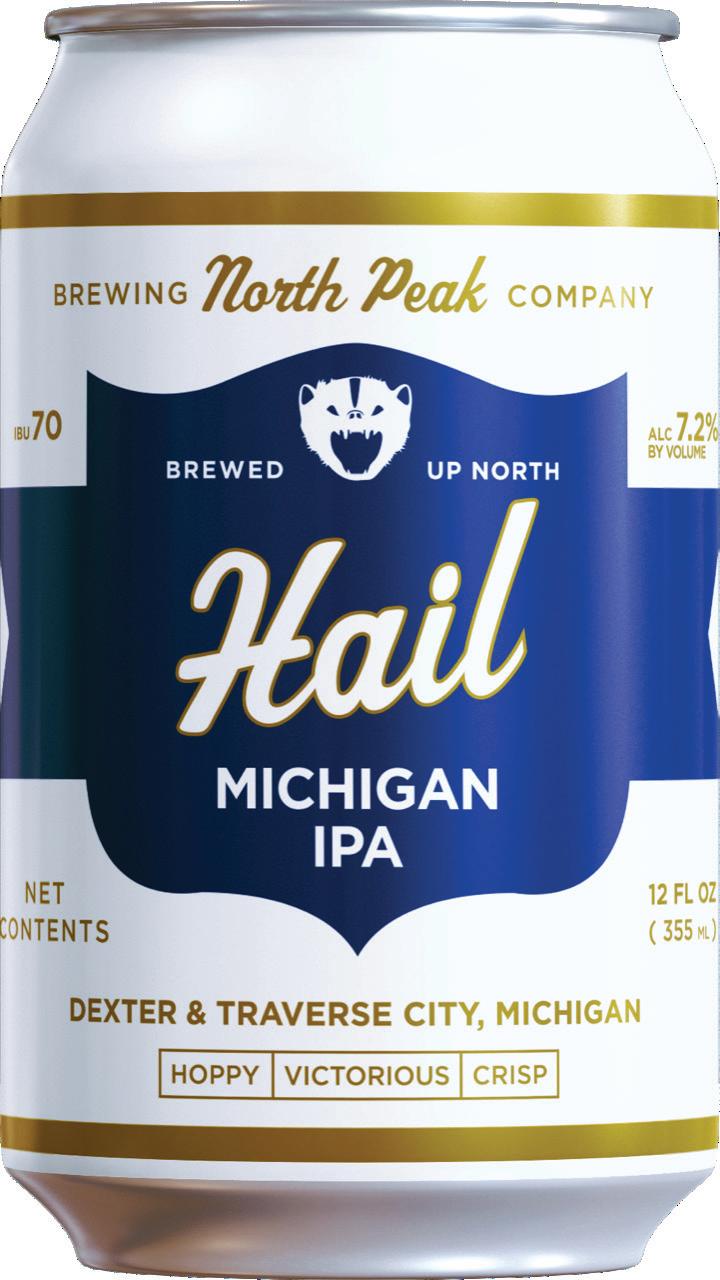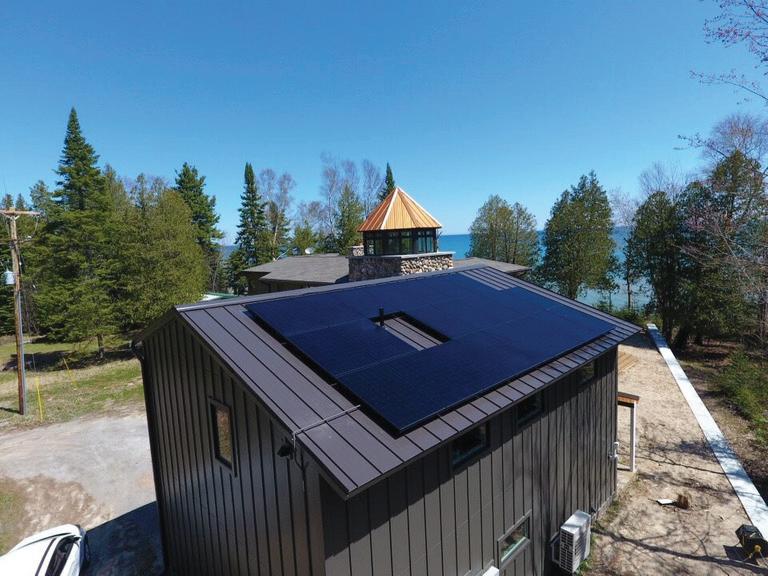
7 minute read
columns & stuff
New Home for the Glen Lake Library
The Glen Lake Community Library moved into its new home earlier this month following a successful fundraising campaign and construction that began in 2019.
The library in Empire was established in 1977 and spent its first years in an old rented building on Front Street before moving into a modified fire hall in 1982 that was added onto repeatedly, doubling in size twice by 1996.
After an operating millage was passed in 2016 in each of the three townships served by the library, its board hired consultants to determine what the library needed and two years later a capital campaign was launched and soon raised $1.75 million to build a state-of-theart, modern library.
HUNT FOR THE REDS OF OCTOBER

Stuff we love The Little Fleet’s Weekly Party Packs
We love CSAs for vegetables — but a CSA for cocktails and beer? Sign us up! The Little Fleet in Traverse City is offering their new Weekly Party Packs every Thursday from October 8-December 17 (no Thanksgiving), and each one is full of goodness and surprises. They tell us “one week you may get well crafted cocktails mixed with local produce...you may get some of our favorite hard-to-find beer. And some weeks you might get it all—beer, wine, and cocktails. Included will be a few small happy hour snacks, along with other fun surprises.” When the nights get long and the snow flies, that weekly surprise pack just might lift our spirits with some spirits. $400 for ten weeks. More at www.thelittlefleet.com
Explore and discover great red wines of Leelanau Peninsula. Takes place weekdays during Oct. Tickets are $25 per person; includes a souvenir wine glass, a complimentary red wine pour at each of more than 20 participating wineries offering diverse red wines, and a $5 donation to the American Red Cross. lpwines.com


M I C H I G A N ’ S L A R G E S T F A R M T O T A B L E D I N N E R A N GROUNDWORK’S D F U N D R A I S E R H A S G O N E V I R T U A L !
AT HOME
JOIN THE LIVESTREAM ON OCTOBER 10
WITH SPECIAL MUSICAL GUEST JOSHUA DAVIS!

Cook with us! Farm box, recipes and shopping list at groundwork.org/harvest.
Harvest is FREE to attend!
REGISTER AT: groundworkcenter.org/Harvest
Bid on local products and experiences in the Silent Auction. Opens Oct. 2.
bottoms up Sparta and Hail
Now that Big Ten football is back, we’re also celebrating the launch of two new brews from North Peak: Sparta and Hail. Sparta is an American IPA apparently made to be drunk while watching MSU; it has a “crisp maltiness and hop profile of Simcoe, Citra, and Cascade hops with notes of tangerine and grapefruit.” Hail is a Michigan IPA, is well-balanced and hop-forward, and is actually brewed with maize (yellow flaked corn) and blue (corn grits).
Both beers are available in individual cans and six-packs at retailers, and on draft at select bars.
Might be good to have a few of each on hand when the Spartans take on the Wolverines in Ann Arbor on Halloween day.

4 Bedrooms, 3.5 Bathrooms 200’ Private Ftg on West Bay Water Views from Every Room 3-Season Waterfront Room Two Gas Fireplaces Hardwood Floors Throughout Quiet, Private Road
3215 Shore Wood Drive MLS 1879876 | $1,699,900

Ann Porter Associate Broker 231.944.4959
Ann@AnnPorterTC.com 522 E Front Street, Traverse City, MI 49686





ScheduleyourFREEsiteassessmentfor solarenergyatyourhome,farmorbusiness 888-90-SOLAR

spectator by Stephen Tuttle
Project 1619, a product of New York Times Magazine writers, is a potential public school curriculum that attempts to redefine early U.S. history by making the as- sertion that slavery and Black Americans were the keystone to our creation and development.
It posits our country’s birth was not 1776, but 1619, the year Virginia colony imported the first African slaves. It suggests our Founders’ lofty ideals weren’t quite so lofty and that “all men are created equal” business was far afield from what was believed and practiced.
They have a point.
The authors of Project 1619, which is still a work in progress, could have gone back even farther. The Spanish brought Afri- can slaves to what is now Florida as early as 1526, but it wasn’t yet a colony. That offense laid the groundwork for the influx of slaves yet to come. The commerce in hu- man beings in North America was nearly a century old by the time Virginia got around to importing their own. By 1776, slavery was perfectly legal and existed in all 13 colonies (Vermont was the first to abolish it a year later). The Decla- ration of Independence makes no specific mention of slavery, though it does manage to get in a line about “... merciless Indian Savages...” At least 41 of the 56 signers of the Declaration were slaveholders. Our Constitution fails to abolish slavery and makes reference to it tangentially in a particularly dehumanizing way: Every slave counts as 60 percent of a person for taxation purposes. Eleven of the 39 who signed the Constitution were slaveholders. To their credit, some refused to sign because the document permitted slavery. In fact, the Constitution and early laws surgically removed plenty of people from plenty of rights. Voting, for example, was restricted to white, male property owners. So was gun ownership. Thomas Jefferson’s soaring, in- clusive rhetoric at the beginning of our Declaration didn’t actually include more than half the country. Jefferson and 11 other early presidents were also slaveholders. We didn’t get around to abolishing slavery until 1865, allowing women to vote in federal elections until 1920 or creating the Civil Rights and Voting Rights Acts until 1965. President Donald Trump, aware Project 1619 is now being taught in some schools, is shocked by this “radical, left-wing propaganda” and has proposed his own alternative. The “1776 Commission” will be created, he says, to develop a “patriotic education.”
Well, okay, but the so-called patriotic ver- sion of American history is what most of us already received. It involves hero worship of the Founders, no hint they ever did anything wrong, and a literal whitewashing of much of our early reality.
While lauding the Great American Experiment, we’ve cleverly skipped over too much of the unpleasantness. Yet the darkness that lurks in the shadows is integral to under- standing our development as a country.
Slavery isn’t the only stain. Our horrific treatment of indigenous people is as old as our enslavement of Africans. The first recorded massacre occurred in today’s Florida in 1536. Hernando de Soto, unable
to enslave local inhabitants, killed them all instead. The notion of “manifest destiny,” that we were ordained by the Almighty to conquer the West, wasn’t sent down from on high but was created by a newspaper columnist. Women had rights roughly akin to what we see in restrictive Muslim coun- tries today, which is to say not many.
Our history books didn’t really cover much of that. And we completely ignored what the Western Hemisphere might have been like before Europeans showed up. Charles C. Mann’s “1491” is a remarkable look at thriving civilizations, including as many as 25 million tribal people already in North America when Europeans showed up.
There are legitimate researchers and histori- ans who question Project 1619’s claim that the U.S. was built primarily on the backs of slaves. And it omits too much to be a reliable substitute for traditional history courses. But it could be a useful addition.
There is nothing wrong with telling our school children the whole story of American history, warts and all. The truth of our history including slavery, our abysmal treatment of indigenous peoples, and our dismissal of women are not pieces of pro- paganda but an honest part of our history.
So, too, are the lofty goals of equality and fairness for all, and the slow but real progress we’ve made. We are currently reckon- ing with racial justice issues that have been percolating for more than two centuries, but we are still trying.
It should be okay to tell our children the American experiment is a noble one born of high ideals not yet reached but to which we still aspire. And that we acknowledge the worst of our past so we are not doomed to repeat it. That would be a patriotic education.




